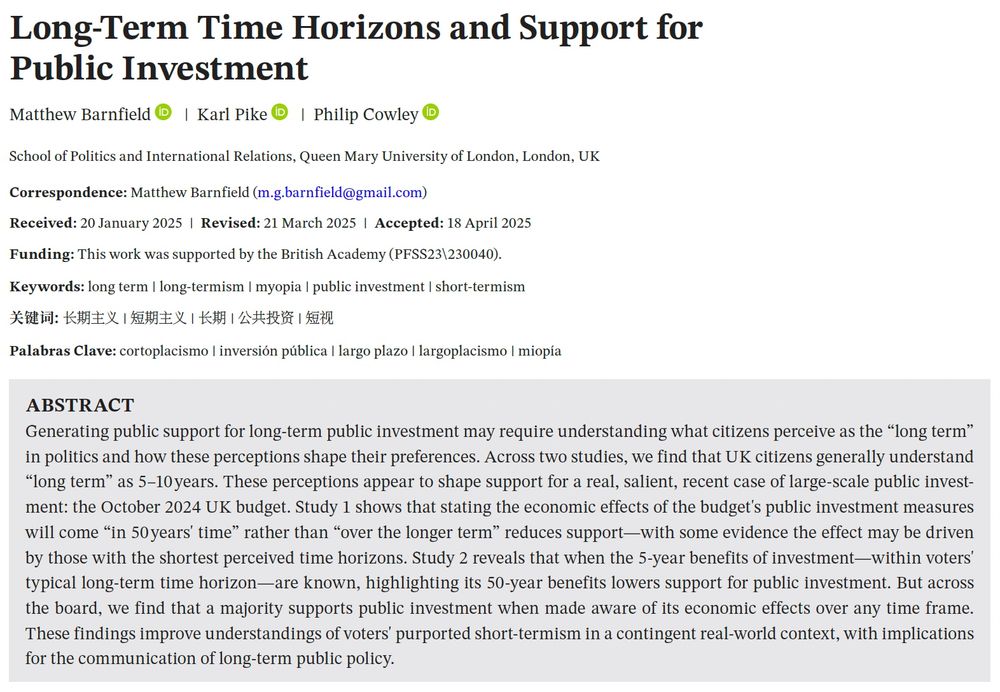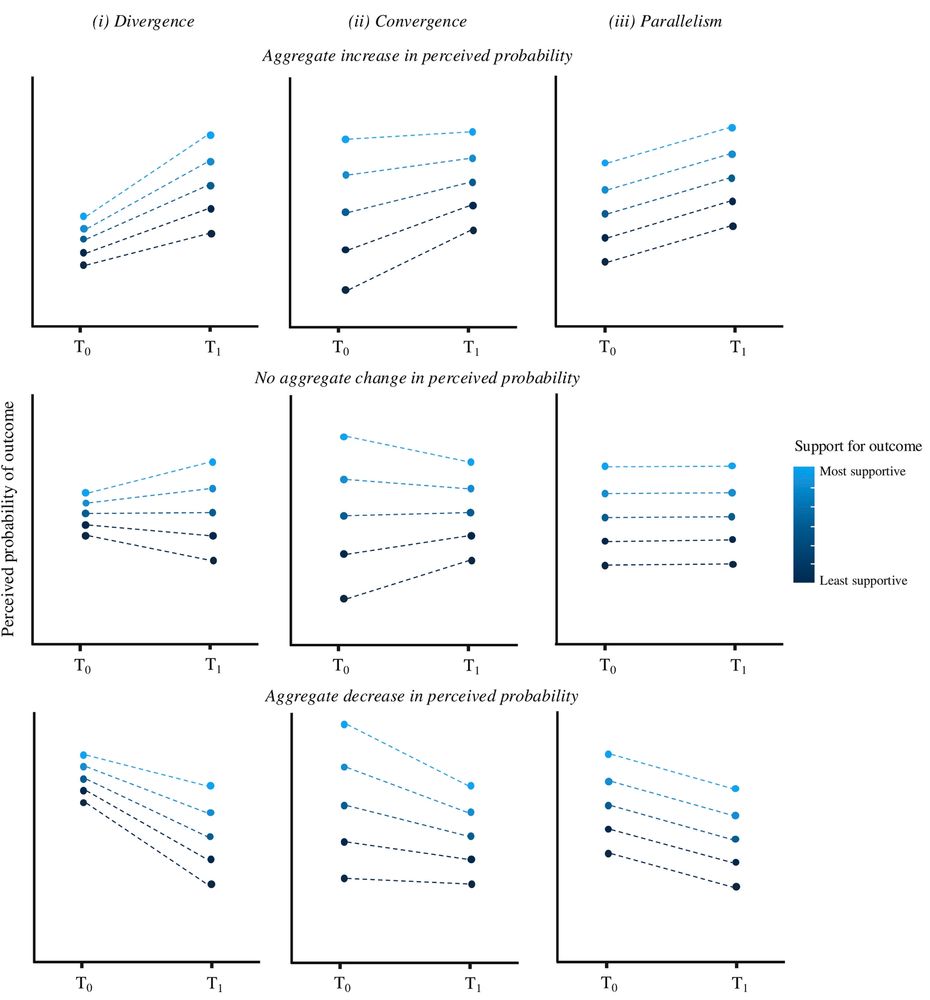
Matthew Barnfield
@mbarnfield.bsky.social
British Academy Postdoctoral Fellow at Queen Mary University of London.
matthewbarnfield.co.uk
matthewbarnfield.co.uk
I have a new article out at @polstudies.bsky.social. In "Electoral Hope", I make the case that supposedly irrational "wishful thinking" is actually a crucial part of how voters make rational sense of their role in democracies.
OA link: doi.org/10.1177/0032...
OA link: doi.org/10.1177/0032...

August 6, 2025 at 1:08 PM
I have a new article out at @polstudies.bsky.social. In "Electoral Hope", I make the case that supposedly irrational "wishful thinking" is actually a crucial part of how voters make rational sense of their role in democracies.
OA link: doi.org/10.1177/0032...
OA link: doi.org/10.1177/0032...
We then show that, when they know about the effect of pub. inv. in 5 years’ time (+0.14% pot. GDP), also knowing about its 50-year effects (+1.4% pot. GDP) significantly *reduces* support – as does hearing that things might not go as well as forecast.

May 28, 2025 at 10:16 AM
We then show that, when they know about the effect of pub. inv. in 5 years’ time (+0.14% pot. GDP), also knowing about its 50-year effects (+1.4% pot. GDP) significantly *reduces* support – as does hearing that things might not go as well as forecast.
This effect appears to be driven by people with the shortest-term understandings of “long term”. For those people, the difference between what they thought long term meant (e.g., 5 years) and what the Chancellor meant by it (50 years) was greatest.

May 28, 2025 at 10:16 AM
This effect appears to be driven by people with the shortest-term understandings of “long term”. For those people, the difference between what they thought long term meant (e.g., 5 years) and what the Chancellor meant by it (50 years) was greatest.
We find that this significantly affects public support for that public investment.
When we told people pub.inv. would boost potential GDP “over the longer term”, they were significantly more supportive than when told that impact would happen “in 50 years’ time”.
(But majority support regardless.)
When we told people pub.inv. would boost potential GDP “over the longer term”, they were significantly more supportive than when told that impact would happen “in 50 years’ time”.
(But majority support regardless.)

May 28, 2025 at 10:16 AM
We find that this significantly affects public support for that public investment.
When we told people pub.inv. would boost potential GDP “over the longer term”, they were significantly more supportive than when told that impact would happen “in 50 years’ time”.
(But majority support regardless.)
When we told people pub.inv. would boost potential GDP “over the longer term”, they were significantly more supportive than when told that impact would happen “in 50 years’ time”.
(But majority support regardless.)
But what is the “long term”? In two UK samples, we find that on average what the public takes politicians to mean by “short term” is around 1-3 years, and “long term” typically something in the range of only 5-10 years.
That varies little across party lines, age groups, education levels, etc.
That varies little across party lines, age groups, education levels, etc.

May 28, 2025 at 10:16 AM
But what is the “long term”? In two UK samples, we find that on average what the public takes politicians to mean by “short term” is around 1-3 years, and “long term” typically something in the range of only 5-10 years.
That varies little across party lines, age groups, education levels, etc.
That varies little across party lines, age groups, education levels, etc.
Our paper “Long-Term Time Horizons and Support for Public Investment” is open access @psjeditor.bsky.social (w/ @karlpike.bsky.social @philipjcowley.bsky.social).
Whether the public supports policy that pays off in the long term depends on what “long term” means.
doi.org/10.1111/psj.70040
Whether the public supports policy that pays off in the long term depends on what “long term” means.
doi.org/10.1111/psj.70040

May 28, 2025 at 10:16 AM
Our paper “Long-Term Time Horizons and Support for Public Investment” is open access @psjeditor.bsky.social (w/ @karlpike.bsky.social @philipjcowley.bsky.social).
Whether the public supports policy that pays off in the long term depends on what “long term” means.
doi.org/10.1111/psj.70040
Whether the public supports policy that pays off in the long term depends on what “long term” means.
doi.org/10.1111/psj.70040
Our paper "Wishful Thinking in Response to Events" is now out @electoralstudies.bsky.social!
w/ @polpsychjoe.bsky.social @florianstoeckel.bsky.social @vittoriomerola.bsky.social @benlyons.bsky.social @jasonreifler.bsky.social et al
www.sciencedirect.com/science/arti...
w/ @polpsychjoe.bsky.social @florianstoeckel.bsky.social @vittoriomerola.bsky.social @benlyons.bsky.social @jasonreifler.bsky.social et al
www.sciencedirect.com/science/arti...



May 9, 2025 at 8:06 AM
Our paper "Wishful Thinking in Response to Events" is now out @electoralstudies.bsky.social!
w/ @polpsychjoe.bsky.social @florianstoeckel.bsky.social @vittoriomerola.bsky.social @benlyons.bsky.social @jasonreifler.bsky.social et al
www.sciencedirect.com/science/arti...
w/ @polpsychjoe.bsky.social @florianstoeckel.bsky.social @vittoriomerola.bsky.social @benlyons.bsky.social @jasonreifler.bsky.social et al
www.sciencedirect.com/science/arti...
This paper has received a lot of useful feedback from many people over the past couple of years – thanks to all of you!

March 14, 2025 at 3:05 PM
This paper has received a lot of useful feedback from many people over the past couple of years – thanks to all of you!
We show experimentally that polls and expert commentary (i.e., Twitter threads by @drjennings.bsky.social and @robfordmancs.bsky.social) significantly shape these electoral expectations, particularly by raising the expectations of otherwise unhopeful supporters of the winner.


March 14, 2025 at 3:05 PM
We show experimentally that polls and expert commentary (i.e., Twitter threads by @drjennings.bsky.social and @robfordmancs.bsky.social) significantly shape these electoral expectations, particularly by raising the expectations of otherwise unhopeful supporters of the winner.
However, when it comes to electoral expectations, it is what psychologists call "hope" – the conviction that when there's a will, there's a way – that matters. Only hopeful people rated their preferred winner's chances higher than (hopeful) supporters of the opposing party.

March 14, 2025 at 3:05 PM
However, when it comes to electoral expectations, it is what psychologists call "hope" – the conviction that when there's a will, there's a way – that matters. Only hopeful people rated their preferred winner's chances higher than (hopeful) supporters of the opposing party.
In our UK sample we find that what psychologists call "dispositionally optimistic" people – those who tend to expect their lives to go well, come what may – are also more optimistic about future collective and societal outcomes. We call these "valence expectations".


March 14, 2025 at 3:05 PM
In our UK sample we find that what psychologists call "dispositionally optimistic" people – those who tend to expect their lives to go well, come what may – are also more optimistic about future collective and societal outcomes. We call these "valence expectations".
Instead, in conjoint experiments with age-group blocking in the UK, I find that regardless of whether policy benefits will materialise within or beyond people's own lifetimes, they prefer them to come sooner rather than later.

September 2, 2024 at 12:17 PM
Instead, in conjoint experiments with age-group blocking in the UK, I find that regardless of whether policy benefits will materialise within or beyond people's own lifetimes, they prefer them to come sooner rather than later.
Today is the first day of my British Academy Postdoctoral Fellowship at QMUL! I'll be studying 'The Political Psychology of the Future' – an attempt to do some blue sky thinking of my own about how politics works in people's heads.

October 2, 2023 at 12:30 PM
Today is the first day of my British Academy Postdoctoral Fellowship at QMUL! I'll be studying 'The Political Psychology of the Future' – an attempt to do some blue sky thinking of my own about how politics works in people's heads.

